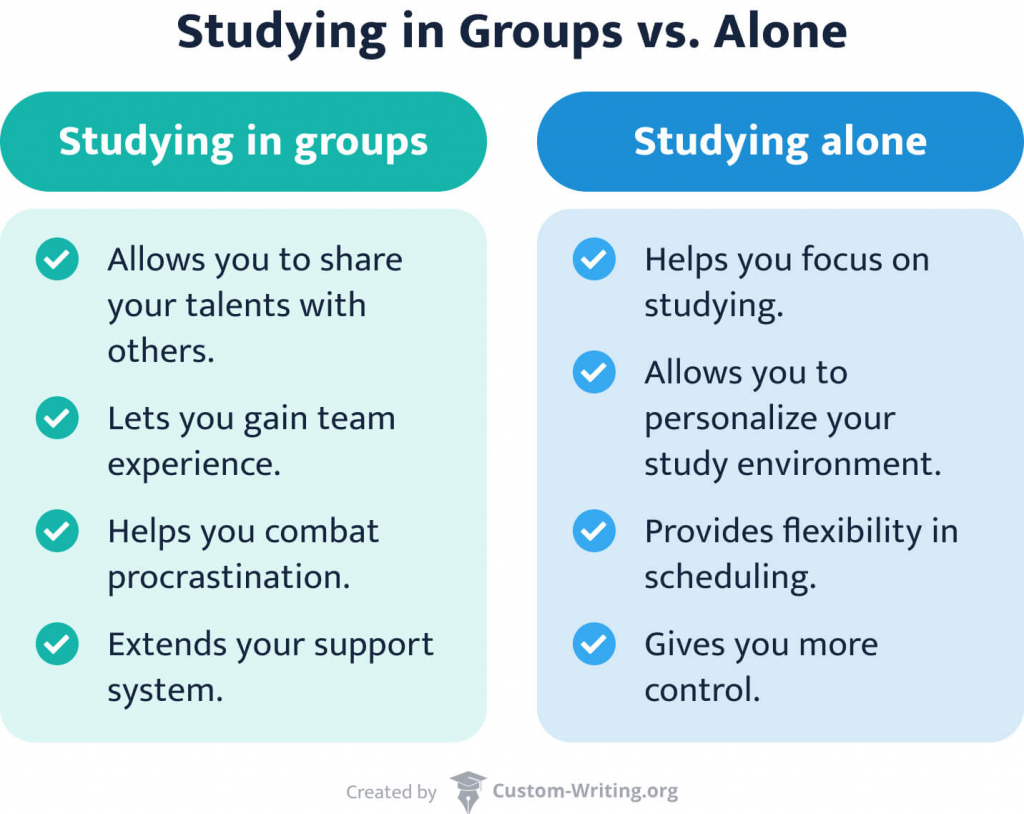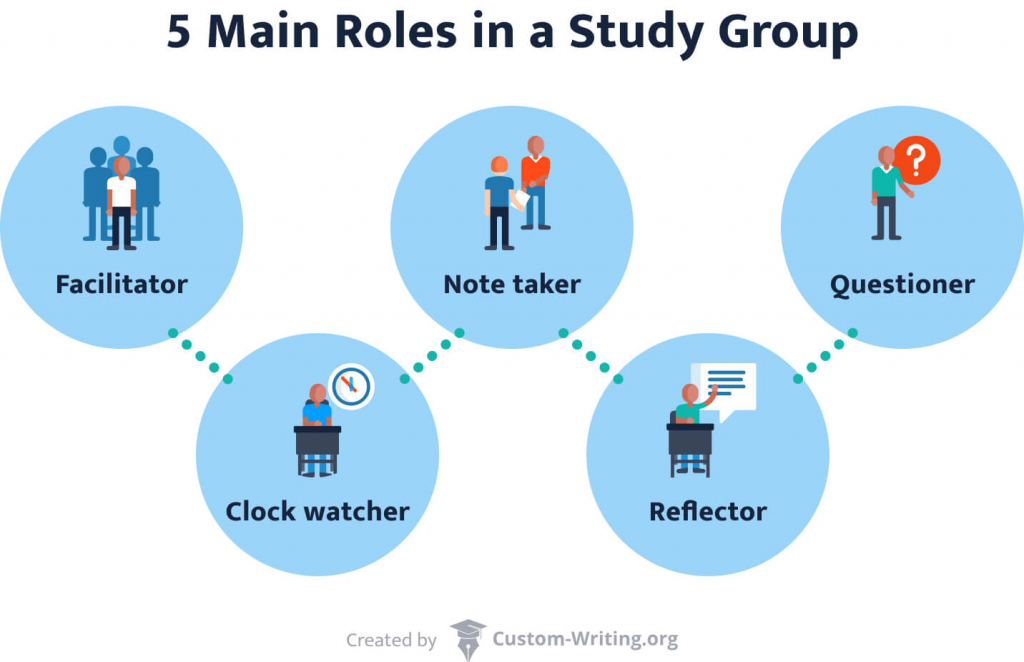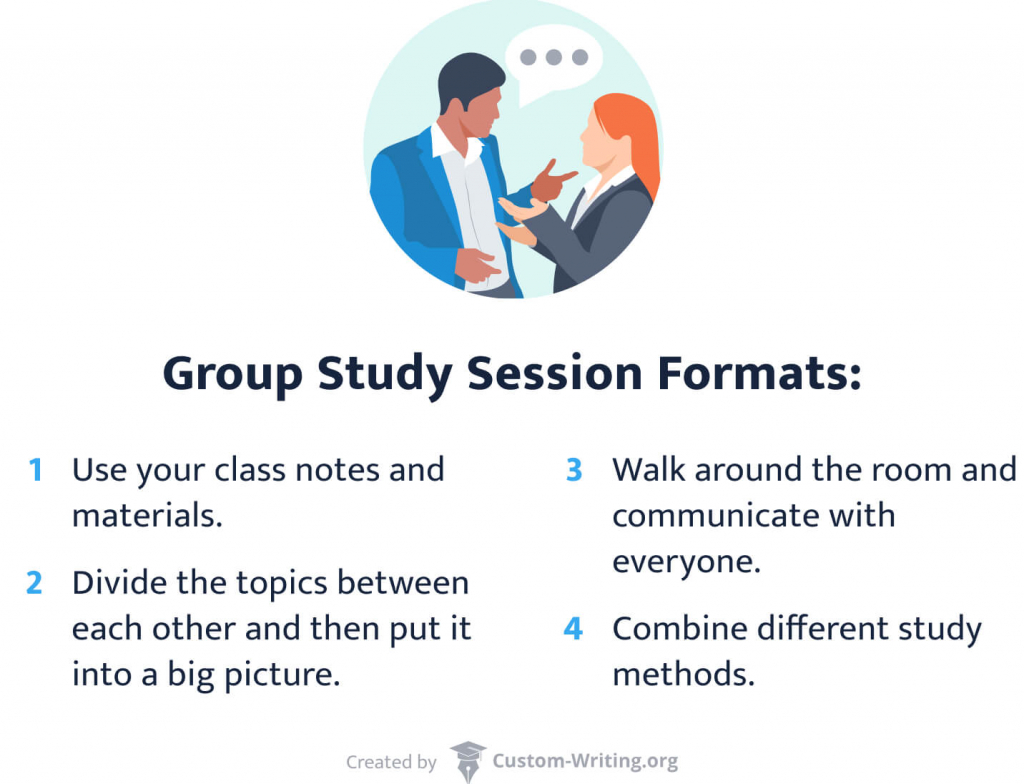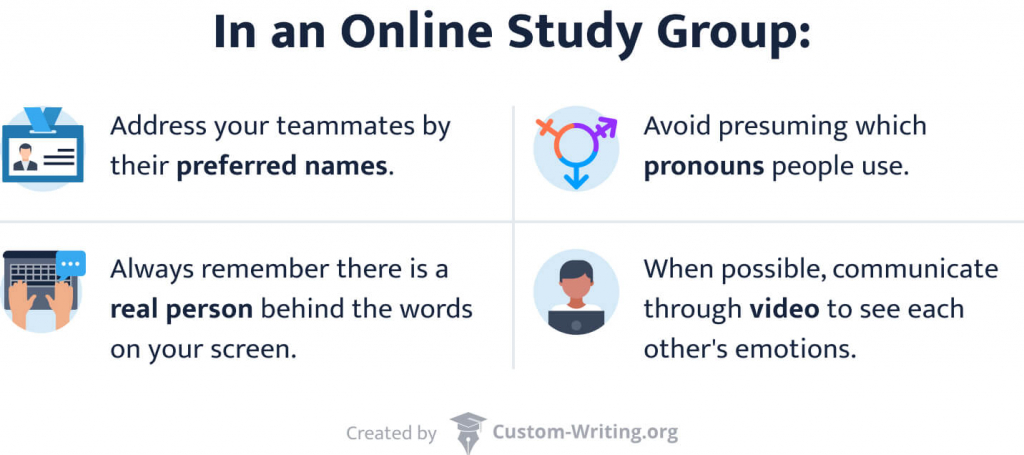Are you looking for actionable ways to retain information? If so, you’re not alone. In fact, many students find that conventional learning methods, such as lectures and textbooks, aren’t enough to help them remember and comprehend facts or concepts.
But did you know that discussing topics and teaching others can drastically increase your memory retention? According to research, students can retain up to 70% of information by discussing it and an impressive 95% by teaching it to others.
And that’s where study groups come in. They can help you memorize information better than ever by engaging in all the ways of perceiving information. Besides, they can boost your motivation and teach you useful skills.

Sounds interesting? Then, keep reading! In this article, our custom-writing experts will explain how to find perfect teammates and study together efficiently.
🎓 Why You Should Form a Study Group
Before going any further, let’s unpack what a study group is. Well, it is a team of students who meet regularly to study or work on complicated tasks. They might gather once a week or right before exams in order to prepare together.
But why even bother forming a study group? Well, there is a whole bunch of advantages!
Study groups can:
- Boost your knowledge of a topic. Each person’s perspective is unique. By working collectively, people can offer diverse points of view on the same subject, facilitating a deeper understanding.
- Combat procrastination. Statistics show that 70% of students report an increase in motivation when they study in groups.
- Get better grades. After collaboratively sharing insights with your companions and becoming incentivized by them, you’ll study more efficiently and improve your performance as a result. It’s as simple as that!
- Sharpen your problem-solving skills. By assisting your peers, motivating them, and resolving issues that arise within the group, you acquire vital abilities for your professional life.
- Gain team experience. When you work in a group, you practice team management and communication. These skills will come in handy for interacting with your future co-workers.
- Share your talents with others. Is there a subject you’re exceptionally good at? Do you want to help struggling students comprehend it? Form a study group!
- Strengthen your support system. The more time you spend together, the tighter your connection gets. Even if you don’t develop friendships, your teammates will expand your network, which is also super important.
…And Why It May Not Be the Best Idea
Unfortunately, studying in groups is no cure-all. It has its shortcomings, and you should know about them right away.
Consider the following aspects before making up your mind:
- Being surrounded by people can be very distracting. This holds true for large study groups and those comprised of close friends. If you’re easily distracted by noise, studying in cramped environments is not the best idea.
- Some of your companions may hinder your productivity. Should they be envious, sluggish, or just inconsiderate, they may have an adverse influence over you, forcing you to sidetrack instead of working on your own progress.
- You can’t personalize your learning. Your team may require you to devote effort to topics that are inessential to you. You won’t always be able to select the subjects for group sessions and adjust your study process accordingly.
- You might all have similar weaknesses. Studying in a group is especially advantageous if you each have different strengths. Groups where all members are weak in the same subject are generally less effective.

So, Is Studying in Groups Right for You?
If you are unsure, try to answer the following questions:
- Do you need to have as few distractions as possible while studying?
If you’re easily distracted by other people or simply prefer to study in a noiseless environment, then joining a study group is not the best idea. - Do you want to have more control over your study environment?
The primary purpose of a study group is to collaborate. This means you won’t be able to do what you want; you’ll have to concentrate on whatever your group finds important. - Do you prefer having a personalized schedule?
Being a group means adjusting your timetable to suit the needs of your teammates. You’ll have to arrive at a specific location at a set time and you may even have to cancel plans to avoid being late.
If you answered “yes” to these questions, then perhaps learning in a group is not for you. And that’s entirely fine. Studying alone also has many advantages, and countless students favor this alternative.
If your answer is “no,” keep reading!
🙋 How to Choose Members for Your Study Group
So, you’ve decided to build a study group. That’s excellent! Now, let’s investigate this process step-by-step, starting with the paramount question: how do you choose members for your study group?
1. Decide on the Number of People
The perfect estimate for study groups is 2 to 5 members. If you surpass that number, the group’s organization can get out of hand, and the individual needs of its members may get ignored. Also, managing the schedules of more than 5 people can be problematic.

2. Spread the Word
Even though it’s a fine idea to select study group members from your class, it’s also worth checking out other classes. You might even ask professors to suggest students who have valuable insights on your subject.
It’s also possible to look for group members online. The only flaw of this option is that you may end up with teammates too far removed from you, so you won’t be able to meet in person. But if you don’t mind, then go for it.
3. Identify Suitable Candidates
Being friends is not an obligatory requirement for potential team members. Certainly, it’s more convenient to study with familiar people than with strangers. But if you want to really excel in group study, then invite those who:
- Can offer value to your sessions;
- Are knowledgeable in several subjects;
- Are responsible;
- Can assist you in areas where you lack knowledge.
When choosing your group members, try to be selective. If too many candidates are willing to join, then we’d recommend refusing some and picking only the most trustworthy and sensible ones.
4. Discuss Each Other’s Personal Learning Styles
To ensure the comfort of every group member, it’s best to analyze their personal learning styles. Personal learning styles refer to the way you prefer to study in relation to other people. There are 2 styles: interpersonal and intrapersonal.
Interpersonal learners:
- Favor an active involvement in discussions;
- Love to communicate and collaborate.
Intrapersonal learners:
- Prefer to study alone;
- Are independent;
- Find company distractive.
We don’t recommend including intrapersonal learners into your study group. They probably won’t gain anything valuable from it, and it will just leave them dissatisfied. Intrapersonal learners study more successfully on their own.
🚀 Determining the Roles Within Your Group
Highlighting the individual skills of each group member and finding a role for everyone will allow you to create the perfect study group where no one is left out and everyone participates in the process. But what are these roles, and how to assign them? Keep reading to learn about it!

5 Roles to Choose From
In fact, there are many roles that can be assigned in a group. We recommend you to focus on the 5 main ones. The first 3 roles are a must, and the last 2 are additional options for larger groups:
- The facilitator keeps track of what occurs during group meetings and make sure everybody is doing their part. They are the leader of the group.
- The clock watcher is the master of time and the right hand of the facilitator. This person organizes the plan for the meeting, structures it, and allocates time to complete each task. During the study process, the clock watcher tells the group when to switch to the next topic.
- The note taker keeps a log of upcoming objectives and notes everything that has already been completed.
- The reflector overlooks the team’s progress and suggests ways to improve the study process.
- The questioner comes into play whenever something is forgotten or neglected. This role requires noting everything that was left out. The questioner also makes sure everyone has the opportunity to voice their opinions.
Strategies for Assigning the Group Roles
Assigning study group roles can be a difficult task. But we’re here to tell you how to do it right! Here are the key strategies:
- Be honest and transparent with your team members while deciding on group roles. Everyone must clearly understand what they will be required to do.
- Hold your teammates accountable for meeting the requirements of their assigned roles. Your team members will get motivated to try their best when they understand that if they fail, their colleagues will get upset. That includes you too!
- Change things up on a regular basis. If the same roles in your group are always assigned to the same people, they might eventually get bored. Changing roles throughout the semester can help you and your peers improve problem-solving abilities and master new skills.
- Voice concerns, and don’t be afraid to criticize your fellow group members. It’s always great to learn from mistakes. Just make sure your statements are supported by evidence, and be tactful when delivering criticism.
🔝 How to Study in Groups Effectively: 11 Tips
Now that you know everything about creating a study group, and perhaps you’ve already gathered one. Of course, you want it to be effective and have all the features of a successful study group:
- Everyone is aware of their objectives.
- The group members get along well.
- All members feel that they belong.
- Everyone works to ensure common success.
- Group members communicate freely.
- Everyone hears and respects each other.
- Fresh concepts triggers attention and interest.
- Members share roles and obligations.
- Disagreements are settled peacefully.
How can you achieve all this? Read on to find out! We will share great tips that will help you better organize your team, avoid mistakes, and get the most out of group study.
1. Choose a Meeting Place
The meeting place where you gather should be comfortable and accessible. Make sure you find a private, quiet area away from household distractions like the TV, PC, family members, or pets. When it comes to furniture, there must be a table around which you can all gather and enough chairs for each group member.
Here are some good and bad ideas for meeting with your team:
Where to meet
- a quiet café with a few visitors
- a quiet library
- an empty classroom in your school
- a park with benches and tables
- an empty gym.
Where NOT to meet
- a movie theater
- a popular café
- big city mall
- a park where you can’t sit down.
💡 Bonus tip:
Check your university or school for purpose-built group study rooms you can use. These rooms usually include everything you might need like blackboards, books, tables, and slots for charging your laptop. Just don’t forget to ask your professor before reserving one of these rooms.
2. Consider Creating a Virtual Study Group
There can be situations when you won’t be able to meet your group in person, should it be bad weather or your group mates being too far away. Consider a plan B and gather online.
Not sure how to do that? Check out our suggestions of top apps that will help you organize meetings and monitor them.
Best Apps for Hosting Study Group Meetings
Here’s a list of tried-and-tested software that will help you gather your groupmates from any place in the world:
- Zoom. This is arguably the most popular online meeting app that allows gathering a lot of people. We recommend using Zoom’s blackboard feature to feel like you’re actually in a classroom.
- Slack. This app allows you to invite a bunch of people to a single chat and conduct complex discussions. It’s very useful for working on big projects.
- Microsoft Teams. MS Teams allows you to gather your teammates and share your PC screens with each other, as well as use video.
- Discord. This is a simple yet practical app that allows you to communicate online in a chat form. Discord is known for its connection stability, which is something your group will definitely appreciate.
- Skype. Skype can be a great app for hosting meetings if your group is not very big. It allows you to share screens, text chat and use your webcam.
💡 Bonus tip:
We recommend asking your peers to turn their cameras on during meetings so that you can see each other. This simple action will increase your involvement and you can be sure that no one is slacking off. It’s also great because you can see your teammates and their reaction to your propositions.
Study Group Apps for Monitoring Progress
You can set tasks, check the performance of your group members, and monitor their progress by using the following apps:
- Notion. This is one of the most popular apps in the form of a cloud planner diary. Notion allows you to store all the necessary information, make a schedule, plan things, organize the group’s work, and create notes using a system of sections and flexible blocks.
- Quizziz. This unique software allows you to create quizzes or tests for your teammates. With its help, you will all be able to check how well you understand the topics you study.
- ClickUp. This app is widely used by supervisors to check their team’s progress. It allows you to set up goals, create checklists, and track the time allocated for each task.
3. Decide When to Meet
It’s best to gather your study group once or twice a week. Getting together before an exam is also a great idea, but for the best outcome you’ll need to meet regularly throughout the semester.
Here are some additional tips:
- An optimal meeting shouldn’t exceed 60-90 minutes in duration.
- When organizing study group sessions online, scheduling tools like When2Meet and Doodle can help you find the perfect time that works for everyone.
- If some of your teammates keep saying they can’t make it, ask them if they still want to participate in your group.
- If one or two members of your group can’t make it, consider gathering a group without them, but be sure to send them everything that was discussed during your meeting.
4. Make Sure Everyone Is Prepared
The most effective study sessions are those where everyone comes ready and prepared. To achieve this, follow these simple tips:
- Choose what you want to cover in your next meeting together with your groupmates.
- Keep track of tasks and assign them to every member of the group.
- Consider using Gmail or Google Documents to make the notes accessible to all of your teammates.
- Be sure to pick the most urgent and important tasks first.
- Decide who will present each of the tasks as you go over them together.
- Ensure that your team is focused on the results.
5. Start by Creating an Agenda
It’s important to create a proper plan (or an agenda) before organizing a meeting. The agenda will outline the meeting’s objectives and serve as a roadmap for the whole session. Having an agenda will help you stay focused on your goals and avoid distractions.

A proper agenda answers to the following questions:
- What is the location and time of the upcoming meeting?
- How are duties and roles divided between participants?
- What are the topics that you’re going to cover?
- How much time will be devoted to discussing each topic?
- Which learning techniques will you use?
We highly recommend creating the agenda in advance so that the essential preparations are completed before engaging in the study process. Also, make sure you collect everything you’ve discussed previously. Doing so can help you avoid spending too much time discussing the previous material.
💡 Bonus tip:
It can be tempting to concentrate solely on one topic per session. However, we advise you to select multiple related topics to make your studies more productive.
Here’s a sample of a completed agenda:
Example:
- State the subjects and topics that will be discussed.
- Examine and analyze class notes and records from previous meetings.
- Ask everyone for ideas or proposals.
- See if anyone has any questions.
- Begin working on the new material.
- Do a brief roundup.
- Create an agenda for the next meeting.
6. Set Start and End Times
Time is your most significant asset. Even before you create a study group, you’ll have to make sure everybody can always make it on time with no delays. There is nothing worse than 4 people having to wait around for one person who has overslept!
Try to organize your meetings to fall at the same time and at the same location. This will make it easier for your group members to prepare before coming to the meeting.
💡 Bonus tip:
If you have completed your objectives before the end time, it is okay to extend the end of the study period for several minutes. Just make sure everyone’s on board!
7. Make Use of Task Managers and Productivity Timers
The internet is filled with excellent apps that can help you organize and manage your meetings. With these apps, you will be able to prioritize tasks like a pro.
Check them out below!
Best Task Managers for Study Groups
Task management apps help you save precious time by ranging tasks and concentrating your attention on what matters most. Here are some of our favorites:
- Todoist. This is a minimalist and accessible organizer. With this app, you can set tasks and sort them by dates, people, or projects. It also provides round-the-clock synchronization.
- Trello. This is a cloud-based program for managing minor group projects. Trello uses an acclaimed method known as Kanban, which is definitely worth checking out.
- Evernote. Evernote is a superb app for taking notes. It’s suitable for creating agendas and saving notes from previous meetings.
- TickTick. This app has a straightforward task sorting system. You can filter multiple tasks by tags, name, date, and time of creation. There is a notepad for notes, a Pomodoro timer, and a “white noise” option to enhance focus.
Best Time Management Apps for Study Groups
Timers are another essential tool. Working on a complex project can easily overwhelm your team. Before you realize it, several hours have passed, and you haven’t progressed at all. That’s why it’s imperative to track time carefully.
Consider picking one of the options below:
- Pomodoro. Pomodoro is a handy browser timer. It’s a favorite among students and employees alike. The service is absolutely free and has many additional perks to offer.
- Marinara Timer. What really makes this app stand out is the option of sharing timers. Each timer is issued with a custom URL that you can send to your teammates. This way, everyone will be able to work within the same timeframe.
- Toggl Track. Toggl is elementary to use: just start it whenever you start a session. If the Pomodoro mode is on, the timer will count down to the specific duration you selected (25 minutes by default.) This is a foolproof way of tracking study sessions, especially if you are planning to take breaks regularly.
8. Pick a Format for Your Study Session
A proper arrangement of your study group meeting will make the session much more productive. After all, every session has unique goals. Think about them while picking a suitable format.

Here are some suggestions to choose from:
- Base your study session on your class notes and the materials given to you by your professor.
- If there are several chapters or topics that need to be reviewed, assign subjects or chapters to each member of the group. In the end, you combine what each member has learned into a complete picture.
- Walk around the room and actively communicate with each of your teammates. Even though it’s a little distracting, it offers everyone the opportunity to voice their opinion.
- Conduct an extended discussion on a tough topic and note down the best suggestions.
9. Use Active Learning Strategies
Now let’s turn to the study methods you may use within a chosen format. The point is to actively engage with the study materials as opposed to passive methods such as reading. We suggest you try a variety of strategies and work out which ones are most effective for your group.
Here are some suggestions:
- Ask challenging questions. Solving complicated problems collectively will do wonders for your analytical skills as well as provide valuable insight.
- Take turns teaching each other. Have one person take on the role of a teacher and address questions or initiate discussions with the group. Once everyone has a good grasp of the material, move on to the next topic.
- Create concept maps and diagrams. Visualizing study material is everyone’s favorite strategy. Visual aids can help your group to see connections between things and thus remember them better.
- Conduct intense study sessions. This will allow your team to approach studies with precise focus and attention. Keep in mind that not everybody prefers to study this way, that’s why it’s best to consult your team members before choosing this method.
- Study collaboratively. Being in a group is a perfect opportunity to ask each other questions, exchange ideas, and provide feedback. Work in pairs to practice tests or simply compete against your study buddies.
- Use retrieval practices. These involve refreshing recently covered material from memory. Examples of retrieval practices include using flashcards or stickers as study tools. Such techniques are highly efficient, and we can’t recommend them enough.
10. Start and End Each Session with a Review
Take a few minutes at the end of your group study session to discuss your overall progress with your peers. We also recommend you make notes so that you have a point of comparison for your next session. Being able to compare your progress will motivate your group and help you notice all the gaps you need to work on.
💡 Bonus tip:
It’s also worth doing quick progress reports or small conclusions after each topic is covered. It’s a fun and easy way to use retrieval practices.
11. Stay Motivated and Productive
Motivation allows you and your teammates to work efficiently and avoid slacking. To boost your motivation, consider the following tips:
- Don’t be afraid of asking questions. If there is anything that bothers you and you can’t resolve it on your own, discuss it with you group and don’t shy away from asking for additional explanations.
- Invent a system of rewards. For example, if you and your teammates manage to understand a complex topic quickly, you can finish the meeting earlier. Or, if one of you gets ahead of the others, then this person will be granted the role of a teacher.
- Make a checklist of tasks. Hang it on the wall, and cross out every task that is completed. There is nothing more motivating than a completed checklist.
- Allow others to lead your team. If a person is given the role of the leader, they will automatically feel more responsible and motivated.
- Voice displeasure when your teammate is being lazy. If your group is working hard and someone is slacking off, it’s important to guide that person back to collaboratively engaging with the group.
👥 Study Group Dynamics: What to Keep in Mind
Keeping a positive and friendly dynamic within your group is a must, even if your group consists of total strangers. Naturally, some will be more active than others, some may try to dominate, and some will be too shy to participate fully. That’s why it’s necessary to work on group dynamics and strive for balance.
We recommend trying these strategies to ensure everyone in the group is equal:
- Agree on what is acceptable.
Set the framework for your communication and be sure to follow it each time you gather your group. - Make sure everyone feels comfortable and safe.
It’s crucial that no one feels intimidated by other group members. The more inclusive your group is, the better. - Encourage everyone to participate.
Be sure to listen to everybody in your group, including those who don’t consider themselves experts on the topic you discuss. Everyone can provide interesting insights! Besides, this way you’ll ensure that no one is slacking off. - Don’t make it a competition.
Competition promotes quarrels and can ruin an otherwise friendly relationship with your teammates. We’ve told you about great ways to motivate yourself—use them! - Make sure everyone is heard.
It’s crucial to everybody is given the opportunity to voice their comments, proposals, and concerns. This way, your group will be able to swiftly fix any problems. - Check if anyone needs additional support.
This will allow slower learners to catch up with the rest of the group, and everyone will be on the same page during discussions. - Be kind and polite.
Communicate nicely and ensure that everyone feels involved, especially in an online study group: address people by their preferred names, avoid presuming which pronouns they use, and always remember that there is a person behind the words that you read on your PC screen. - Avoid conflict.
Conflicts break morale and motivation and can even ruin the group. If any of your group members are being toxic, consider removing them from the group completely.

🎁 Bonus Tips for Getting the Most Out of Your Study Group
We’ve prepared some extra recommendations as a bonus! We’ve asked students from effective study groups about lesser-known things that help them make each session better than the last. So, here are the best exclusive tips for maxing out the success of your study group:
- Create a master document. We advise you to use GoogleDrive, OneDrive, or any other app to store all your notes. This way all the materials will always be accessible, and your teammates will be able to revise everything that you’ve covered during your group meetings.
- Get some refreshments. Sipping a cold soda during studies can give you much needed energy. Be sure to place a couple of refreshments on the table in your group study room, if possible. Just avoid alcohol because this will make your mind sluggish!
- Celebrate your victories. You already know that rewarding yourself and your peers will offer you all a giant boost of motivation. But how about especially epic rewards for achieving important goals? For example, if all group members get an A for the next exam, you’ll bring a cake to the next group meeting and celebrate together.
- Challenge each other. This is what should you do instead of competing. Create quizzes, come up with potential exam questions, and discuss the most difficult topics together. Even if you don’t find the right answers, the interaction alone will help you get amazing insights into the subjects.
- Be honest about your goals. It’s important to be realistic. If you keep overestimating your goals, you’ll eventually realize that, in truth, you’ve achieved nothing. Instead, acknowledge your real progress, even if it’s small, and be sure to note every drawback.
Possible Pitfalls to Avoid
Some study groups fail at the very beginning. We wanted to know why, so we asked some study group members about their unfortunate experiences and what pitfalls they’ve encountered. This is what they recommend avoiding at all costs:
- Don’t let your study group become a social group. You gather to study, which is the main goal of your group. You are not here to socialize. That’s why it’s crucial to avoid your relations from getting too personal. Otherwise, you’ll be discussing everything but your studies during your meetings.
- Don’t allow anyone to dominate. Everyone’s progress must be similar to ensure that all of you are equally important to the group. If anyone is trying to dominate the group, be sure to voice your concerns.
- Don’t encourage complaining. There is a certain category of people that tend to whine and complain about everything. A good critique is valuable, but don’t let it turn into constant arguing.
- Don’t let hitchhikers and couch potatoes into your group. Hitchhikers and couch potatoes use others to study for them. Hitchhikers may be manipulative and are typically just looking out for themselves, and couch potatoes are lazy. Don’t allow such individuals into your study group!
- Don’t get behind or too ahead of the others. Make sure your group is moving at an even pace together. Avoid letting anyone lagging far behind or finishing everything before others have even started. You gather as a group, and you must study as one!
- Don’t be late, and avoid making excuses. To avoid conflicts, make sure you always arrive on time. If you’re unable to come, then be honest about the reasons why you’re late and don’t make it into a regular habit.
We’ve shared with you all there is to know about study groups. This way of studying is totally worth trying! By following our simple tips and recommendations, you’ll be able to get the most out of this process. Good luck!
🔍 References
- Study Groups: The University of North Carolina at Chapel Hill
- Discovering Why Study Groups are More Effective: Washington University in St. Louis
- Joining a Study Group: The Benefits: QS World University Rankings
- Developing Effective Study Groups in the Quest for the “Holy Grail”: Critical Thinking: National Library of Medicine
- Conducting Study Groups – In-Person & Remote: Oregon State University
- Five Tips for Making Study Groups Work: Northumbria University Newcastle
- Tips for Starting a Successful Study Group: The University of British Columbia
- For Faculty: Promoting Study Groups in Your Course: Northwestern University
- Guide to Effective Study Groups: Muhlenberg College
- Study Groups: University of Kentucky
- Exam Revision: Getting the Best out of Study Groups/Discussions: London School of Economics and Political Science
- Group Study: Carnegie Mellon University
- Study Groups: University of Rochester
- 6 Reasons to Join a Study Group: University of Technology, Sydney
- Successful Study Strategies: Wellesley College
- Study Groups: The University of Minnesota
- How to Form a Successful Study Group: Tips and Strategies: Western Connecticut State University
- 5 Easy Steps to Set up Inclusive, Self-Running Study Groups within Your Module: University of Sussex
- Guidelines For All Study Group Types: Florida International University
- Student Guide for Studying Together: Cornell University
- Does Working as a Group Actually Help Us Learn?: The Guardian
- 8 Benefits of Studying with Friends: Medium

![The Scaffolding Technique in Education: Benefits & Examples [Is It Really Useful?]](https://custom-writing.org/blog/wp-content/uploads/2023/03/business-women-signature-document-1-284x153.jpg)








![How to Deal with FOMO in College [+Turn It into JOMO]](https://custom-writing.org/blog/wp-content/uploads/2022/10/smiling-african-student-pointing-with-pencil-laptop-screen-concentrated-blonde-woman-glasses-propping-chin-with-hand-while-working-with-computer-office-1-284x153.jpg)
